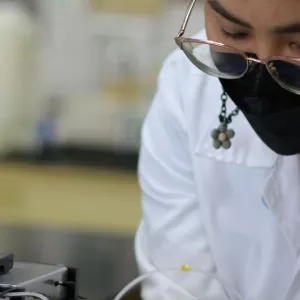Breeding gains from fostering a culture of continuous improvement
How streamlining processes saved the IRRI breeding lab nine days and $15,000 a year Los Baños, Philippines (11 September 2024): To ensure a steady supply of nutritious, climate-resilient, and user-preferred crop varieties for smallholder farmers worldwide, CGIAR breeding teams must continuously enhance data accuracy, streamline processes, and achieve higher rates of genetic gains. While improving breeding processes is crucial for

Breeding gains from fostering a culture of continuous improvement
How streamlining processes saved the IRRI breeding lab nine days and $15,000 a year
Los Baños, Philippines (11 September 2024): To ensure a steady supply of nutritious, climate-resilient, and user-preferred crop varieties for smallholder farmers worldwide, CGIAR breeding teams must continuously enhance data accuracy, streamline processes, and achieve higher rates of genetic gains. While improving breeding processes is crucial for delivering these crop varieties, optimizing supporting operations is equally important for enhancing the overall system.
In the Philippines, the Genotyping Services Laboratory (GSL) and Grain Quality Nutrition Services Lab (GQNSL) of the International Rice Research Institute (IRRI) provides essential services to breeders. Together, these labs form IRRI’s Service Laboratories (ISL) , which have been continuously optimizing their processes in recent years. They have found that even minor adjustments in work habits can have a tremendous impact.
In 2019, IRRI Service Laboratories (ISL), accredited to ISO/IEC 17025 standards, began adopting a continuous improvement approach and implementing a quality management system. Maria Reveche, Associate Manager at GSL, is involved in process improvement and supports lab teams in identifying bottlenecks that impede their efficiency. This work is also aided by the Business Process Management (BPM) of the Breeding Resources Initiative , which specializes in optimizing CGIAR crop breeding activities.
Over the past year, Reveche and her team have focused on improving the genotyping-related steps of the breeder varietal development process, applying the Lean problem-solving methodology in which they were trained.
Breeders’ varietal development process path. Credit: IRRI.
“Breeders rely on genotype data to make selections and perform crossings. Before that, a purity test of the parents is crucial to ensure that the seeds are true to type. If they are not and are mixtures instead,…

